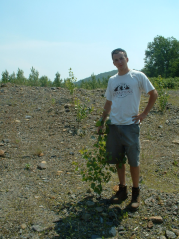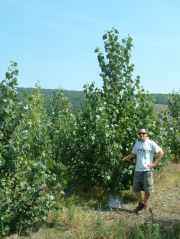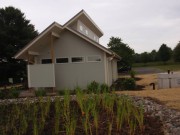Biosolids Land Application Technical Assistance
For several municipal WWTPs - Evaluate feasibility of land application, prepare permit applications, identify suitable farms, develop map of farm showing setbacks, staging and storage areas, and biosolids application areas, communicate with farmers regarding compliance with Soil Conservation Plans and Nutrient Management Plans and provide technical guidance during implementation of land application programs. Prepare annual reports to PADEP and USEPA check for compliance, and develop sampling plans.
American Green
Served as a subcontractor to this company that hauls and land applies biosolids. Biosolids are used in reclamation of surface coal mines to grow either grass and legumes or hybrid poplar trees. Scope of work includes assistance with permitting and public outreach, providing instructions for calibrating spreaders, creating and maintaining storage areas, recordkeeping and reporting, evaluating odor issues and experimental methods of odor control. Work also includes writing and compiling information for annual reports to PADEP.
Residuals Management Plan for the Easton Area Sewer Authority
Served as a subcontractor on a project to evaluate sludge processing, disposal and utilization alternatives. The work involved evaluation of anaerobic digester and belt press performance. In addition, we checked for regulatory compliance with requirements for pathogen reduction and vector attraction reduction prior to land fill disposal. Another portion of the study evaluated the septage receiving facility, the ability of the plant to process septage and other trucked in wastes, and the potential revenues that could be generated by accepting outside residuals and wastewater. We developed a long list of biosolids processing and end use or disposal alternatives, conducted a preliminary screening with input from the client, and further developed the best options. This resulted in conceptual design and cost estimates.
Biosolids Management Plan for the Chalfont-New Britain Township Joint Sewage Authority
The scope of work involved evaluation and screening of a long list of biosolids management alternatives including field inspections of several innovative technologies. Developed unique decision matrix to assist the client in considering all aspects of the alternatives and assigning a rating system to each element. This process led to the selection of an indirect dryer that is well suited to an average size WWTP (4-10 MGD.) Currently assisting with marketing of the heat dried product to sod farmers and topsoil dealers.
“Establishing a Benefit-Cost Framework for Evaluating Biosolids Management Options”
Water Environment Research Foundation Study.
The core objective of this project is to help wastewater agencies better understand and communicate all the pros and cons of their biosolids management options. This work product will provide a
logical and user-friendly framework that agencies can apply, so they can discern for themselves what options make the most sense, and also so that they work with and effectively communicate their
options and findings to governance officials (e.g., city councils, state/federal regulators), customers, and other stakeholders. Garvey Resources assisted in the project to develop,
demonstrate, and convey a practical and readily implementable benefit-cost analysis (BCA) framework to enable wastewater utilities to (1) identify and assess the risks, costs, and benefits of a broad
array of biosolids management options, including both disposal and beneficial (value added) reuse alternatives; and then (2) apply the framework to compare options, communicate with stakeholders, and
select/implement suitable biosolids management and risk mitigation practices.
Full Cost Accounting Protocol for Biosolids Management
As a team member, on a project for the Water Environment Research Foundation, Garvey Resources was asked to itemize wastewater treatment plant costs. The resultant work product, Full Cost Accounting for Biosolids Management, is a series of spreadsheets, which may be completed by virtually any utility manager and compared with other facilities. The benefits of this tracking tool over the long term include ability to compare the cost of various technologies, and identify potential areas for cost savings.
Survey Conducted for the Philadelphia Water Department
This report was a regional study to identify existing processing facilities’ capacities and the projected future waste quantities and characteristics that could be expected from the region. Garvey Resources oversaw the report, gathered data from local haulers and processing plants, compiled previous project data, created a map depicting the processing plants, and formatting and printing the report itself.
Abington Wastewater Treatment Plant for their Biosolids Management Report
This study took a holistic approach to biosolids management decision-making. The comprehensive study evaluated thickening and digester operation and recommended operating and mechanical changes, evaluated bench test results of various dewatering equipment, identified and evaluated end use and disposal alternatives, conducted an odor audit and conceptual design of odor control equipment, estimated costs for digestion, dewatering and end use of the biosolids. Co-author for a paper presented at the 2000 WEF Residuals and Biosolids Specialty Conference.
EnviroVentures Inc.
Garvey Resources provided technical assistance to this biosolids and septage-processing facility who wished to process and beneficially utilize an Exceptional Quality biosolids. Work included process development, advice in monitoring and sampling, preparation of permit applications, licensing as a specialty fertilizer and liming agent, determining agronomic rates, assistance in permit compliance, nutrient management planning and annual report preparation. The product, named OrganaGrow, is in great demand locally.
The application included a description of processing, a description of the end product, instructions to users and analysis of the environmental safety of the proposed practice. The biosolids cake is approximately 20 percent lime on a dry weight basis. This results in an initial pH of 12 or greater and maintaining that pH for 2 hours and maintaining a pH of not less than 11.5 for an additional 22 hours.
Biosolids Marketing Plan
Confidential Client
Garvey Resources was retained by a client to develop a marketing plan for use of their Exceptional Quality biosolids product in reclamation projects. The ultimate goal of the project was to identify potential users of this alkaline stabilized product and determine optimum land application procedures to establish vegetative growth. GR worked toward this goal through completion of the following tasks:
· The identification of potential customers - This work included telephone calls and transmittals to distribute information and to educate potential users on the availability and benefits of this product.
· Determination of customer needs and product values - This task focused on identifying customer needs regarding land reclamation and revegetation. GR determined what the potential customers were paying for services involving fertilizer and organic matter needed to establish vegetative cover. This was weighed against the cost of delivery to determine cost effectiveness.
The result of this work showed that potential clients were enthusiastic about the benefits of biosolids over conventional fertilizer and that many large quantity users were anxious to purchase this product. Ongoing work relates to Department of Agriculture licensing and registration as well as a beneficial use approval from the state environmental protection agency.
Innovative Land Application Project Using Hybrid Poplars
In response to an RFP to the Philadelphia Water Department, Garvey Resources assisted in the development and preparation of a proposal to use Class B biosolids to establish a tree farm on mined land in need of reclamation.
Biosolids were used as a sub-surface fertilizer to establish and support a vigorous stand of hybrid poplar trees. Hybrid poplars, a quick growing species, are receiving much interest as a green energy resource and as a tool that can be utilized in the reclamation of disturbed sites. An advantage over traditional means of biosolids land application is that this technique will significantly reduce the need for stockpiling and virtually eliminate any off-site odor issues related to incomplete incorporation.
Hybrid poplar use has recently expanded from past traditional use in windbreaks to producing wood/fiber/fuel products and to remediate contaminated sites and treat waste. These hybrids are also capable of using more water and nutrients, which make them ideal for waste management applications. Coal burning power plants are planning on using this means of rapid biomass production to earn carbon sequestration credits to offset emissions of greenhouse gases.
Garvey Resources worked with local environmental groups to distribute information about this innovative technique and to build public support early in the project. We also developed the plan for an Environmental Management System for this project.
Hybrid poplars are among the fastest growing tree species in North America. They are capable of accumulating enormous amounts of wood and biomass in a relatively short period of time. With proper care and selections of appropriate varieties, poplars can also sequester enormous amounts of carbon dioxide in a short period of time. Wood products manufactured from poplar trees can make this sequestration permanent. Poplars, for this reason, have received considerable attention as a potential tool to help combat global warming.
The ability to establish these trees as a useful crop may serve purposes beyond the restoration of mined lands. If trees can be used to restore mined land across the commonwealth, those businesses that rely on forestry resources may provide economic growth and development within the region. Furthermore, the potential for these trees to serve as a fuel resource in the production of power may help reduce the dependence on fossil fuels.
Abington Wastewater Treatment Plant- Biosolids Management Report
This study took a holistic approach to biosolids management decision making. Abington Wastewater Treatment Plant, located in a residential community in the Philadelphia suburbs, had been plagued with odor complaints and escalating cost
The comprehensive study evaluated digester operation and recommended operating and mechanical changes, evaluated bench test results of various dewatering equipment, identified and evaluated end use and disposal alternatives, conducted an odor audit and conceptual design of odor control equipment, estimated costs for digestion, dewatering and end use of the biosolids.
Some questions that were addressed in the report were: Does the cost of digestion offset the cost of downstream processing and end use or disposal? How can we eliminate odor complaints from the neighbors? Which is better: belt press or centrifuge dewatering?
A paper was co-authored with the client and presented at the 2000 WEF Residuals and Biosolids Specialty Conference.
Philadelphia Water Department
Garvey Resources conducted a study for the Philadelphia Water Department to evaluate the needs and potential revenue from a City operated septage and wastewater residuals receiving facility. The study included development of survey instruments, interviews, regulatory review, and economic projections.
During the course of this study, nearly 50 wastewater treatment plants in the Mid-Atlantic region were surveyed to determine trends in biosolids management alternatives, costs for contracted hauling, processing, end use and disposal. The study also identified the majority of facilities in the region that accept wastewater residuals in liquid or dewatered form, the quantities of material accepted, and the criteria for acceptance.
With our help, Waste Management & Processors, Inc (WMPI), who is a contractor for the Philadelphia Water Department, implemented an innovative technique for the beneficial use of Philadelphia’s biosolids. With the input of ERCO, Inc of Maryland, we have been using biosolids for the restoration of mined lands. In May and June of 2005, we planted 8 plots of Hybrid poplars at the Repplier Mine site in Schuylkill County. Mining at the site started over fifty years ago. At that time, the environmental regulations to reclaim mine land had not been developed. The previous owner left the site ungraded and un-reclaimed. The biosolids applied to this land contributes much needed organic matter as well as nutrients such as nitrogen and phosphorous.
We have the responsibility, with the help of WMPI and Lehigh Engineers, of taking statistical data from all the plots in addition to testing the biosolids underneath the ground and the water quality at these sites.
WBE
PA Certified Woman Business Enterprise
WOSB
FEDERALLY CERTIFIED WOMEN-OWNED SMALL BUSINESS

Nutrient Management Planning Specialist
Odor Management Planning Specialist
Follow Garvey Resources, Inc. on Facebook
Keep informed about the latest biosolids news and trends by following Diane Garvey's Biosolids Blog.
Diane's most recent post is entitled, "The Latest Information About Covid-19 as It Relates to Biosolids"
Biosolids Blog
News & Events
Diane Garvey was recently awarded the David A. Long Memorial Educational Service Award by the Pennsylvania Water Environment Association!
This award was established in honor of Dr. David A. Long in recognition of his lifelong service and dedication toward the education and training of wastewater and water treatment plant operators and environmental professionals.
This award is presented to individuals who distinguish themselves through their efforts and contributions to the education of water quality professionals.
DC Water has launched its new branded biosolids product: BLOOM. And you can learn about this project at the new website:
For more information on any of the above topics, please contact Diane Garvey at diane@garveyresources.com or call 215-362-4444.
Garvey Resources was a partner in the development of the Rodale Institute's Water Purification ECO-Center. Read about it on our Biosolids Blog.
Contact Us or Make an Appointment
We invite you to call or e-mail us today to discuss optimizing your biosolids program.
For answers to your questions or to schedule an appointment, please call:
215-362-4444
Or send us an email at info@garveyresources.com.




